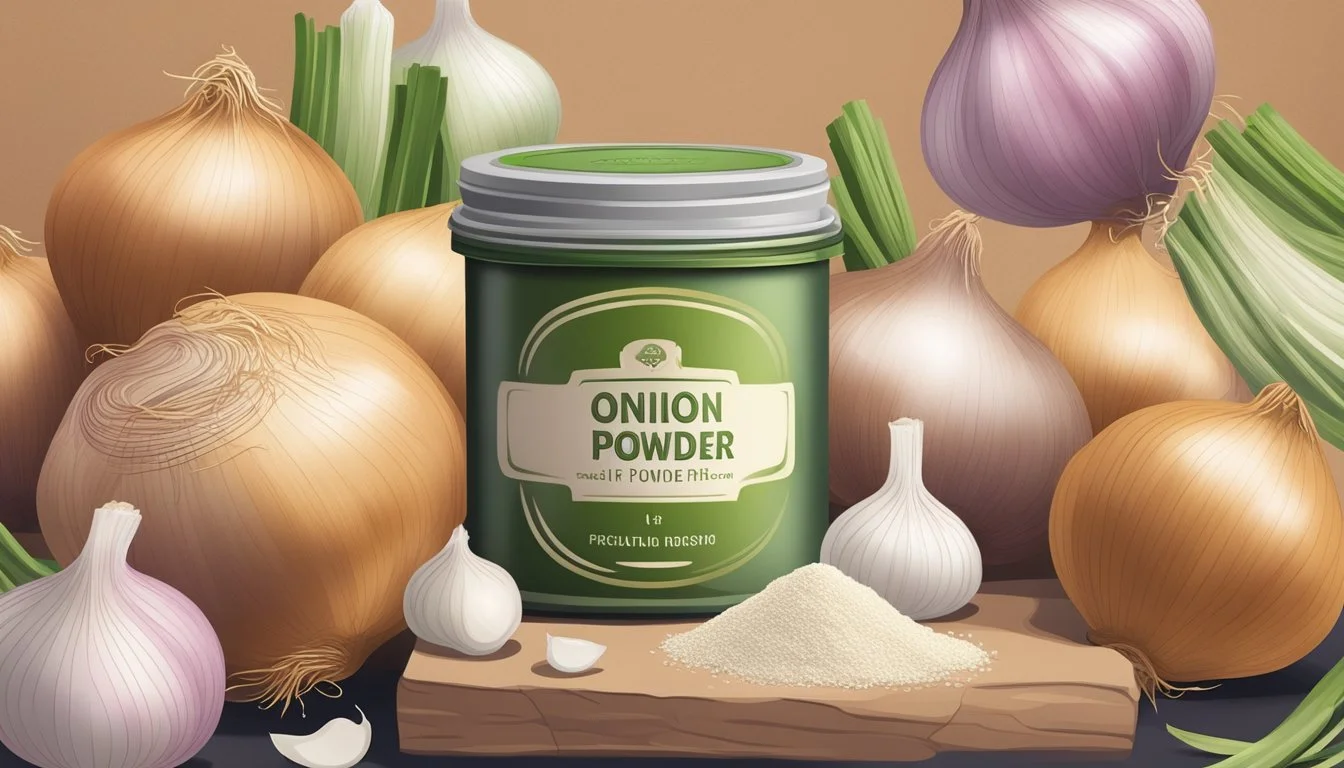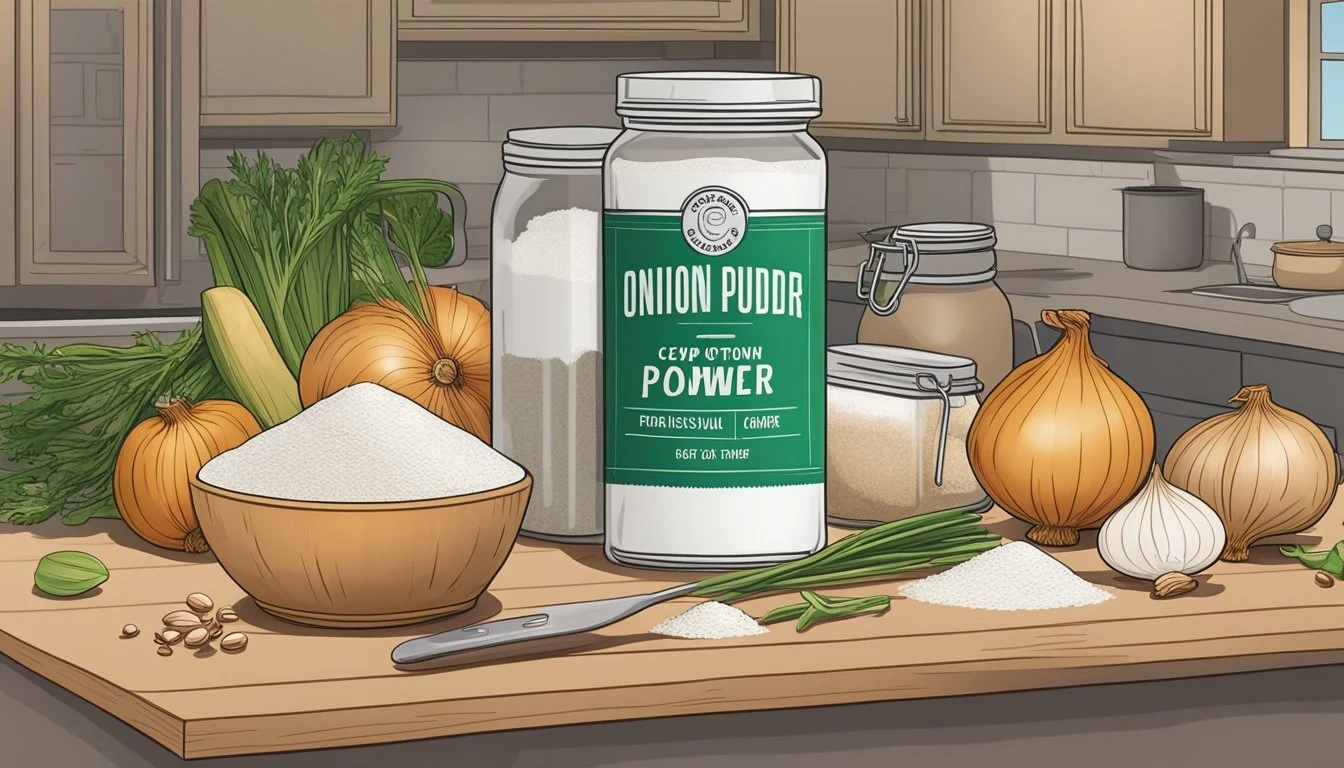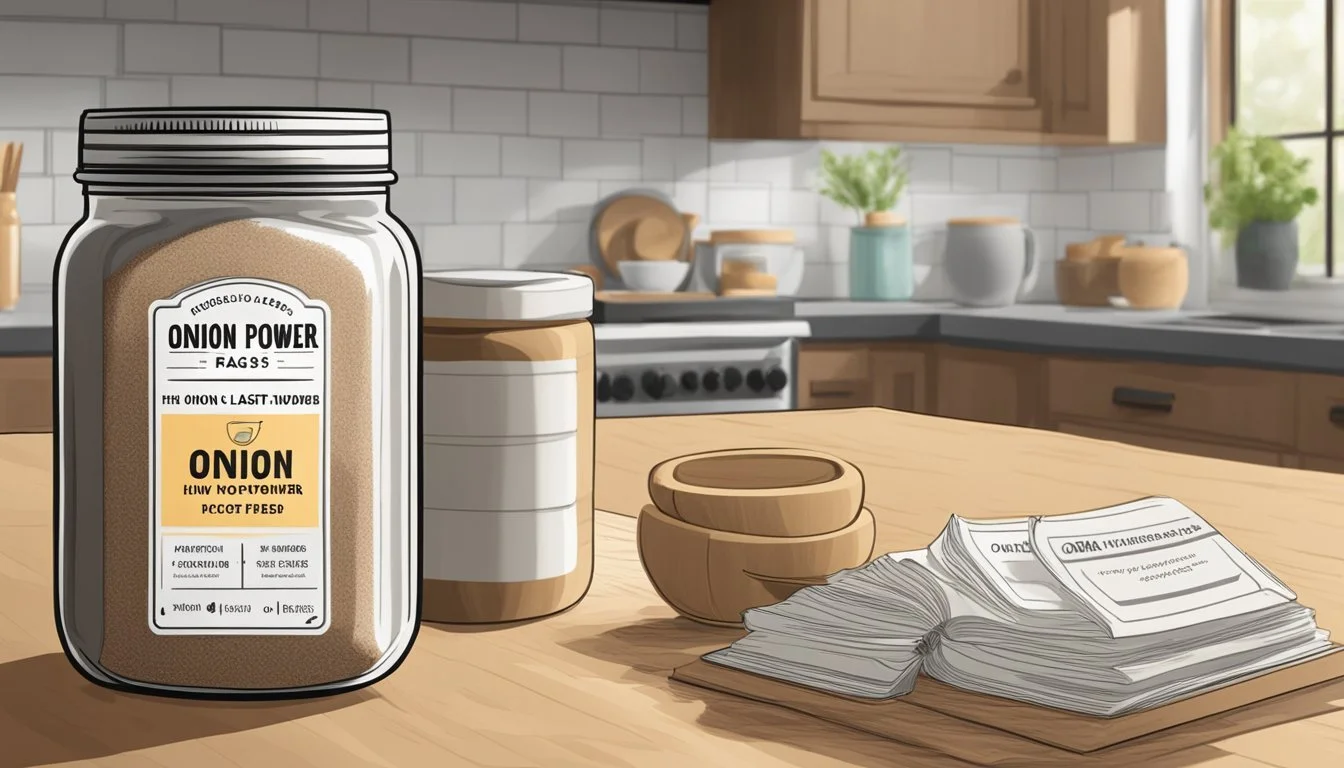How Long Does Onion Powder Last?
Understanding Shelf Life and Storage Tips
Onion powder is a staple in culinary arts, capturing the flavor of onions (What wine goes well with onions?) in a convenient, concentrated form. It is prized for its longevity compared to fresh onions, offering a shelf-stable option for cooks. The shelf life of onion powder typically ranges from 6 months to 4 years, depending on storage conditions and whether it is store-bought or homemade. To maximize its lifespan, onion powder should be stored in an airtight container situated in a cool, dry place away from light sources.
Store-bought onion powder generally offers a longer shelf life, remaining viable for around 3 to 4 years—thanks to the commercial dehydration process and added preservatives. In contrast, homemade onion powder, which lacks these preservatives, will usually last between 6 and 8 months and should be kept in refrigeration to maintain its quality.
The quality of onion powder over time can be influenced by exposure to elements such as light, moisture, and heat. Signs of degradation include clumping, color changes, and a decrease in aroma and flavor, indicating that the spice may no longer impart the desired culinary effects and should, therefore, be replaced.
Understanding Onion Powder
This section provides insights into the nature of onion powder and its place within the culinary world compared to other similar ingredients.
Definition and Uses
Onion powder is a seasoning made from dehydrated and ground onions. It offers a convenient way to impart onion flavor into various dishes without the need for fresh onions. Chefs and home cooks often use it in soups, rubs, marinades, and sauces because of its ability to dissolve and blend into the recipe, providing a consistent onion taste throughout the dish.
Comparing Fresh Onions, Garlic Powder, and Substitutes
Fresh onions are the natural source of onion powder and are used for their distinct texture and flavor in cooking. They come in a variety of types such as white, yellow, and red, each offering different levels of sweetness and intensity. Garlic powder, while also made from dehydrated ground garlic, brings a different flavor profile to a dish and is not a direct substitute for the sharp, slightly sweet taste of onions.
Ingredient Use Case Flavor Profile Shelf Life Fresh Onions Soups, sautéed dishes, (What Wine Pairs Best with Sautéed Dishes) raw in salads Sharp, sweet, can be mild depending on the variety 2 to 3 weeks in pantry; longer when refrigerated Onion Powder Seasonings, dry rubs, sauces, and marinades Concentrated onion flavor, slightly sweet 3 to 4 years in proper storage conditions Garlic Powder Seasoning, similar applications as onion powder Robust, slightly spicy, earthy Similar to onion powder, 3 to 4 years with proper storage
Substitutes for onion powder include fresh onions, onion flakes, onion salt, or a different seasoning altogether like garlic powder, though it should be noted that each alternative will impact the flavor and texture of the dish differently. In recipes, one tablespoon of onion powder is approximately equivalent to one medium chopped fresh onion.
Storage Fundamentals
Proper storage is critical for maximizing the shelf life of onion powder. It requires specific conditions to retain its flavor and potency.
Ideal Storage Conditions
To ensure optimal longevity, onion powder should be stored in a cool, dry place, such as a pantry or cupboard away from heat sources and sunlight. Temperature fluctuations and exposure to light can accelerate the degradation of the onion powder. Keeping it in a consistently dark environment supports preservation of its quality.
Containers and Environment
Airtight containers are essential for preserving onion powder. Containers might include:
Jars: Glass or plastic jars with tight-fitting lids are suitable for preventing the intrusion of moisture and other contaminants.
Mason jars: Often used for their sealable lids, they offer an airtight environment.
Airtight containers: Commercially available dedicated airtight containers designed for spices can be particularly effective.
One should avoid storing onion powder near the stove, sink, or in a spice rack that receives daily light exposure. An airtight seal prevents moisture, which can cause clumping and mold, as well as exposure to air, which can diminish aroma and flavor over time.
Shelf Life Determinants
The longevity of onion powder is influenced by various factors that affect its potency and freshness. Proper storage conditions are critical in preserving its quality up until the expiration date.
Factors Affecting Potency and Freshness
Storage Conditions:
Moisture: Onion powder must be stored in an airtight container to keep moisture out.
Temperature: Keep it in a cool, dry place away from heat sources.
Light Exposure: Store in a dark place to avoid degradation from sunlight or direct sunlight.
Expiration Date:
Manufacturer's expiration date provides a guideline for anticipated shelf life under ideal conditions.
Signs of Quality Degradation
Appearance and Odors:
Fresh onion powder should be uniform in color. Any discoloration might indicate spoilage.
If the powder forms hard clumps, it suggests moisture has entered the container.
A musty or uncharacteristic odor is a sign that the powder may no longer be fresh.
Flavor and Potency:
A loss of flavor or reduced potency over time implies it's past its prime.
Regular checks for signs of spoilage can prevent the use of degraded onion powder in cooking.
Preventing Spoilage
To ensure that onion powder retains its quality and does not succumb to spoilage, certain storage practices must be observed. These methods are crucial in safeguarding the powder from contaminants, mold, and clumping, all of which are signs of degradation.
Best Practices for Longevity
Storage Environment:
Temperature: Keep it in a cool and dry place.
Away from Light: A dark cupboard or pantry shields it from degrading light.
Container:
Airtight: An airtight container is essential.
Material: Glass jars or metal tins with secure lids are preferred.
Handling:
Keep it sealed when not in use.
Use dry utensils to prevent moisture intrusion.
Common Preservation Mistakes
Exposure to Heat and Moisture: Storing near stoves or sinks can introduce heat and steam, leading to clumping and potential mold growth.
Frequent Air Exposure: Each time it is opened, quality can diminish; thus, it should be kept sealed when not in use.
Old Containers with Weak Seals: Compromised seals allow air and contaminants in, which can spoil the powder faster.
Maximizing Potency
To maintain the flavor and effectiveness of onion powder, certain methods during its preparation and culinary use are essential.
Proper Dehydration and Grinding
One of the critical steps in preserving the potency of onion powder is ensuring that the onions are fully dehydrated. A food dehydrator is an ideal tool for this purpose, as it provides a consistent temperature that can be controlled easily. The onions should be sliced uniformly and placed on a dehydrator tray in a single layer to ensure even dehydration. If a food dehydrator is not available, an oven set to a low temperature can be an alternative method but requires close attention to avoid burning.
After dehydration, the dried onions should be ground to a fine powder. A coffee grinder is highly effective for this task, yielding a consistently fine and potent powder. A blender can also be used, though it may produce a coarser texture. For those who prefer a manual approach, a mortar and pestle allows for more control over the grain size, which can influence the release of aroma and flavor.
Cooking Usage Tips
When integrating onion powder into cooking, one should keep in mind that its potency is best preserved when added towards the end of the cooking process. Heat can diminish the aroma and flavor, so it is advisable to incorporate onion powder into dishes such as soups, stews, or sauces in the last few minutes of cooking.
Moreover, to prevent clumps and maintain potency, it's important to store onion powder in a cool, dry place in an airtight container. Humidity and exposure to light can degrade the flavor and reduce its shelf life. Storing the onion powder correctly will help retain its rich, savory taste and maximize its shelf life.
Alternatives and Homemade Options
When onion powder is unavailable or has surpassed its shelf life, individuals have two primary options to consider: crafting homemade onion powder or utilizing commercial and natural substitutes.
Homemade Onion Powder Guide
To make homemade onion powder, one needs to start with chopping onions finely to ensure even dehydration. The onion should then be spread out in a thin layer, preferably on a baking sheet if using an oven or dehydrator trays. Dehydration involves drying out the onion pieces until they are completely free of moisture, thus preventing spoilage and mold. This can be done using a low-temperature oven over several hours or a food dehydrator. The key is to avoid any moisture, as it can lead to spoilage.
Once the onions are completely dried, the pieces should be ground into a fine powder using a spice mill or a blender. Achieving a consistency similar to commercially dried powder is essential for the homemade version to be an effective substitute. The resulting powder should be stored in an air-tight container to protect it from moisture and preserve its flavor. Direct sunlight should also be avoided as it can degrade the quality of the powder over time.
Commercial and Natural Alternatives
When creating the homemade powder is not an option, there are various commercial and natural alternatives one can turn to:
Onion Salt: It's a blend of onion powder and salt, and can be a quick alternative. However, one should reduce additional salt in the recipe to compensate for the added salt content.
List of Substitutes:
Fresh Onions: Use approximately 1/2 cup of finely chopped fresh onions to replace each tablespoon of onion powder.
Dehydrated Onion Flakes: They can be ground to a powder if necessary and used in a one-to-one ratio.
Garlic Powder: It is a suitable alternative due to its similar flavor profile. Substitute with garlic powder in a 1:1 ratio but expect a distinct garlic flavor.
Shallots: Finely minced shallots can provide a milder flavor and work well in many dishes that call for onion powder.
To ensure these substitutes provide the desired flavor, one should adjust quantities based on the particular tastes of the ingredients and the recipe's requirements. Each alternative offers a unique flavor profile and texture, so select the substitute that best suits the dish in question.
Special Storage Cases
When considering the longevity of onion powder, specific storage scenarios significantly affect its shelf life. Storing onion powder in the refrigerator is recommended for homemade products. The cooler temperature and controlled humidity within a fridge extend the homemade powder's usability, with an expected shelf life of 6 to 8 months.
For commercially produced onion powder, refrigeration is not mandatory but can be beneficial. A tightly sealed container in a fridge can help retain the powder's quality beyond the typical pantry shelf life. However, the key to effective refrigeration is ensuring the container is completely airtight to prevent moisture from seeping in, as moisture is a primary foe of onion powder's potency.
Adding desiccant packets to the container of onion powder can further absorb any inadvertent moisture that may have been introduced into the environment, thereby protecting against clumping and spoilage.
Below is a table summarizing optimal storage conditions:
Storage Location Expected Shelf Life Remarks Pantry 3-4 years Cool, dry place away from light required. Refrigerator 6-8 months Airtight container necessary for homemade. Freezer Not recommended Freezing may introduce unnecessary moisture.
One should avoid placing onion powder in the freezer, as this can introduce unwanted moisture when thawing, leading to clumping and reducing its quality. Maintaining a consistent and neutral environment is pivotal to preserving the spice's integrity.
Using Onion Powder in Recipes
Onion powder is a versatile ingredient that can effortlessly enhance flavors in a wide variety of recipes. Chefs and home cooks alike appreciate it for its ease of use and long shelf life, making it a pantry staple.
Soups and Stews
In soups and stews, onion powder works as a time-saving alternative to fresh onions. Add a teaspoon per cup of liquid to imbue a subtle, sweet onion flavor. For depth, sprinkle it in during the early stages of cooking so that it can meld with other ingredients.
Casseroles
For casseroles, onion powder distributes onion flavor more evenly without the need for chopping. Approximately 1 tablespoon per 4-6 servings will suffice, ensuring every bite is flavorful.
Salad Dressings
Salad dressings benefit from onion powder as it blends smoothly, leaving no chunks or uneven textures. A 1/2 teaspoon can significantly elevate a basic vinaigrette or creamy dressing.
Potato Dishes
In potato dishes, whether mashed, roasted, or gratineed, onion powder can be a secret ingredient. It boosts savoriness without overwhelming the palate. For every pound of potatoes, consider using 1/2 to 1 teaspoon of onion powder.
Usage Tips:
Measure Precisely: Too much can overpower a dish.
Blend Well: Ensure it's evenly distributed throughout the recipe.
Taste as You Go: Adjust according to your preference.
By integrating onion powder into these dishes, one can achieve a delightful onion flavor while also saving on prep time.
Onion Powder FAQs
How Long Can Onion Powder Last?
Onion powder typically has a shelf life ranging from 6 months to 4 years. The longevity of onion powder depends on how it's stored. To maximize its shelf life, one should store it in an airtight container in a cool, dry place, away from direct sunlight.
Does Onion Powder Lose Its Potency Over Time?
Yes, onion powder can lose its potency over time. As it ages, the flavor may become less pronounced. However, it generally remains safe to consume even if the flavor has diminished, as long as it was stored properly and is free from bugs or bacteria.
What Are Indicators That Onion Powder Has Gone Bad?
One should check for changes in color, smell, or presence of clumps which may suggest moisture contamination. Any signs of organic growth or an off smell indicate that the powder should not be used.
Can Additives Affect the Shelf Life of Onion Powder?
Additives may be included to prevent clumping and improve flow. Some additives might slightly extend the longevity by reducing the risk of clumping, which can lead to spoilage.
How Does Improper Storage Affect Onion Powder?
Improper storage can result in exposure to moisture or insects, which can degrade the quality further. Moisture can lead to clumping and promote the growth of bacteria and fungi, while insects can lead to contamination.
Note: It's essential to always check the "best by" date provided by the manufacturer but use sensory cues along with proper storage practices to determine actual usability.
Practical Storage Tips
Proper storage of onion powder is essential to preserve its aroma and flavor. To achieve this, one should follow these straightforward strategies:
Airtight Containers: Onion powder retains its quality best when stored in airtight containers. Mason jars or any container with a tight seal can protect the powder from moisture and other contaminants.
Temperature Considerations: It is important to store onion powder in a cool, dry place. Temperatures that are too high may cause the powder to lose its potency quicker.
Placement on Spice Rack: Positioning onion powder on a spice rack requires thoughtful consideration. Avoid placing it near heat sources like the stove or in direct sunlight, as these conditions can degrade the powder's quality.
Here is how one can incorporate the use of specific tools and containers effectively:
Using a Dehydrator: If making homemade onion powder, a dehydrator ensures optimal dryness, which is key for long-term preservation.
Grinding with a Food Processor: When creating onion powder, a food processor can achieve a fine consistency, which should be immediately stored to maintain freshness.
Seal the Flavor In: After each use, one should ensure the lid is secured tightly, so the powder's aroma doesn't diminish over time.
By following these tips, one can ensure that onion powder remains a vibrant and flavorful addition to dishes for as long as possible.
Making and Storing Homemade Onion Powder
Creating homemade onion powder involves dehydration and grinding; proper techniques ensure maximum freshness and flavor retention.
DIY Dehydration Steps
To dehydrate onions, one first peels and thinly slices the onions. These slices are spread out on a baking sheet lined with parchment paper to prevent sticking. A food dehydrator is the ideal tool for this task, as it evenly circulates air and maintains a consistent temperature. If one lacks a dehydrator, an oven set to the lowest temperature, typically around 170°F, can be used. The goal is to dry the onion slices until they are completely brittle, which can take several hours depending on the method and equipment used.
Grinding and Preservation
Once the onions are brittle, they're ready for grinding. A coffee grinder is highly efficient for achieving a fine powder, though a mortar and pestle can be used for a coarser grind. After grinding, the homemade onion powder should be stored in an airtight container to protect against moisture and to preserve its freshness. For best results, this container should be placed in a cool, dark place or refrigerated. The ground powder typically maintains its potency for 6 to 8 months when stored correctly.








